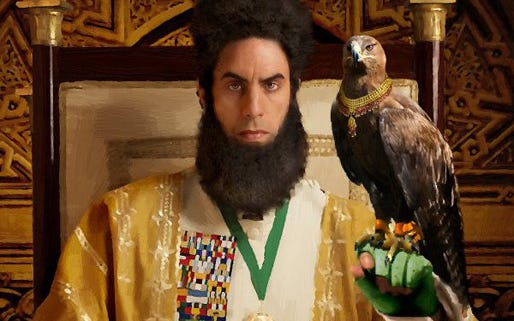The Dictator

Comfort is the last notion anyone associates with Sacha Baron Cohen — a satirist who has bagged feces, mocked real terrorists and taken a teabag for laughs.
But comfortable — too comfortable — is how the comedy feels in Cohen’s latest, “The Dictator.”
It doesn’t take credits for a “physical comedy consultant” and “audience researcher,” to feel the synthetic calculation in this, Cohen’s fourth starring turn. Only in flashes does Cohen unleash the anarchic, mischievous and massively funny alchemy for which he’s known.
Give him credit, though, for going to a different, albeit, dryer well of broad character comedy. Far too recognizable now to goad real people into grotesque behavior under elaborate ruses, Cohen wisely abandons the well-layered — and well-lawyered — approach he mastered in “Borat: Cultural Learnings of America for Make Benefit Glorious Nation of Kazakhstan” and “Bruno.”
And he’s still trying to fire kill shots with his comedy — ostensibly satirizing a thin line between modern-day democracy and barbarous dictatorships. But his aim is off, unable to corral punchlines that no longer easily present themselves in the form of real people. Here, Cohen’s shtick feels less outrageous, less incendiary, just … less.
Still, Cohen’s worst is better than much of what has been a woeful year for comedy. Even if it’s in fits and starts, “The Dictator” recalls the Marx Brothers gone mental and is modestly successful in the see-if-it-sticks mentality of Zucker-Abrahams films.
Cohen is Admiral General Aladeen, the iron-fisted leader of Wadiya — a North African nation on the cusp of developing nuclear-weapon capabilities.
Details of Aladeen’s history are revealed with nasty relish. His mother died shortly after birthing him … smothered by a pillow. He changed 300 Wadiyan words to “aladeen,” including “positive” and “negative” — a gag with stronger mileage than expected. Celebrities willfully whore themselves out to Aladeen, caring only if the check clears. (The gag expands to other world leaders before paying off with a hilarious cameo.)
Aladeen is so vain even his sunglasses sport medals, but deep down, this lonely despot just wants to cuddle. Even if it’s fleeting, Cohen shows a touch of the pathos he brought to “Hugo’s” isolated station inspector.
However, the world only cares about Aladeen’s alleged nukes, and the United Nations demands he address the delegation. He obliges, not knowing Wadiyan rebels have marked him for death. They want Wadiya to make nice with the world’s superpowers and exploit its fertile oil fields for profit.
The rebels’ stooge is Efawadh, a brain-addled double for Aladeen also played by Cohen. Borat, as you recall, had a wildly uproarious cultural misconception of Jews. Here, Efawadh accidentally pours urine on Israeli diplomats. Cohen is still pushing buttons here. This time, they’re just not connected to anything that makes us laugh. (Efawadh’s lone funny bit is his reference to a TV as a “talking painting.”)
Aladeen narrowly escapes assassination (in the first of many torture jokes that feel like, well, you know). But when he tries to storm the UN, he’s beaten back by riot police and rescued by Zoey (Anna Faris) — a proud political activist and proprietor of an independent grocery store, where Aladeen’s rigid ruling hand comes in handy.
When Aladeen reunites with Nadal (Jason Mantzoukas), the presumed-dead leader of Wadiya’s nuclear program, he plots revenge. But such freedoms of democracy as masturbation and a growing attraction to Zoey start softening his resolve, and the movie’s edge.
Mantzoukas and Cohen are fun antagonistic foils, as Nadal advises Aladeen to downplay his grandiose tendencies. “Keep your performance small and real,” Nadal says.
So why, in that helicopter ride, does Nadal engage Aladeen in harmless foreign-language conversation about bin Laden, the Empire State Building and the Statue of Liberty — with exploding “firework” gestures — of which frightened Americans onboard presume the worst? Had Nadal shushed Aladeen and apologized to the Americans, both to no avail, the same joke would carry more controversial charge.
This is where abandoning many “Borat” and “Bruno” writers and aligning himself with Alec Berg, Jeff Shaffer and David Mandel proves somewhat of an error. That trio penned brilliant episodes of “Seinfeld” and “Curb Your Enthusiasm,” but their sitcom style outweighs Cohen’s instinct toward smart satire.
Just look to Aladeen’s climactic speech. Pairing Capra uplift and Cohen cynicism, it becomes an unholy marriage with its clumsy, on-the-nose delivery.
Still, “The Dictator” is not without a handful of belly laughs: a Wii game that seems wildly inappropriate until you consider how “Call of Duty” makes cultural and political conflicts into a commodity; a severed-head joke way beyond the decapitated bear in “Borat”; and perhaps the first-ever meet-cute inside a mucous membrane, during a scene featuring the fearless scene-stealer Kathryn Hahn.
The rest lands somewhere between bomb and brilliance — essentially an 83-minute riff on one joke that’s easily Cohen’s weakest effort since 2002’s “Ali G Indahouse.”
Much like “Borat” and “Bruno,” people will probably still be talking about “The Dictator” in 10 years. The topic, though, won’t be its bold, brazen comedy, but whether it emboldened Cohen to greater challenges or mired him in mediocrity.


